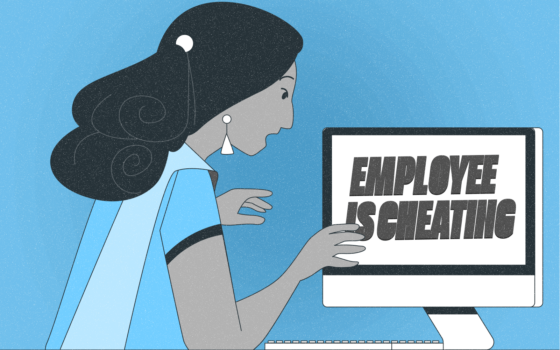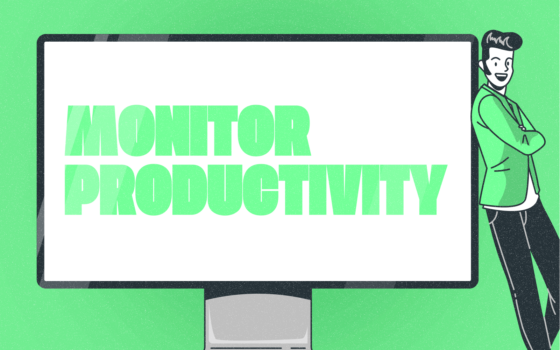Mastering Business Etiquette: Key to Professional Success
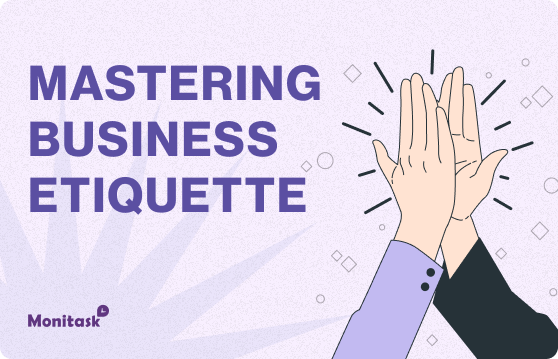
Business etiquette refers to the set of behaviors, manners, and practices that are deemed appropriate and respectful in professional settings.
Mastering business etiquette is essential for building strong relationships, fostering trust, and creating a positive impression, whether you’re interacting with colleagues, clients, or stakeholders.
Below, we explore the key principles of business etiquette and how to implement them in the workplace.
What is Business Etiquette?
Business etiquette refers to the set of unwritten rules, behaviors, and customs that guide professional interactions and relationships in the workplace and business settings.
It encompasses how individuals conduct themselves, communicate, and interact with others to show respect, professionalism, and cultural awareness.
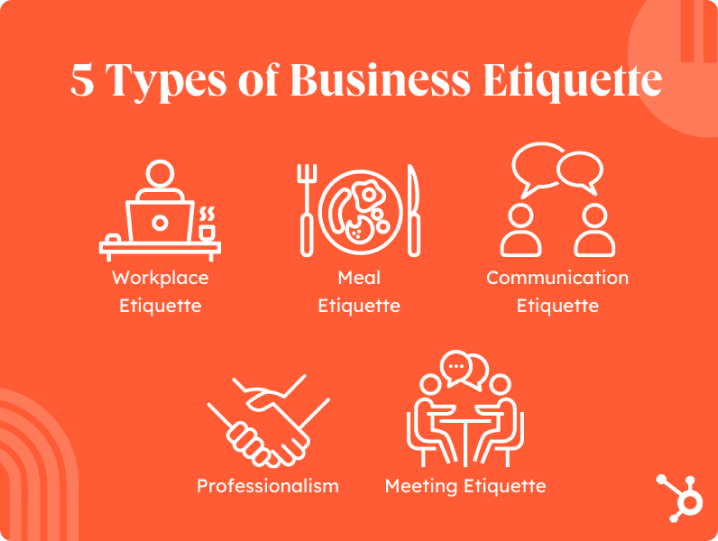
The Importance of Business Etiquette
Business etiquette plays a crucial role in fostering professional relationships, enhancing communication, and maintaining a positive work environment.
It encompasses a wide range of behaviors and practices that help individuals navigate the workplace with respect, courtesy, and professionalism.
In today’s fast-paced, globalized business world, adhering to proper etiquette can distinguish individuals, contribute to career success, and ensure smooth interactions among colleagues, clients, and partners.
Building Strong Professional Relationships
First impressions matter, and business etiquette is key in making a lasting and positive one.
From how you greet others to your email communication style, showing respect and thoughtfulness sets the foundation for trust and collaboration.
Using polite language, being punctual, and maintaining good manners signals to others that you value their time and presence, which helps build rapport and credibility.
Whether in-person or virtual, proper business etiquette establishes a sense of professionalism that leaves a lasting impact.
Effective Communication
Clear and respectful communication is at the heart of business etiquette. It promotes transparency and prevents misunderstandings.
A simple gesture like listening attentively, offering constructive feedback, or maintaining a polite tone can go a long way in creating a positive atmosphere.
Additionally, in written communication such as emails and messages, attention to tone, grammar, and structure ensures clarity and avoids misinterpretations.
Practicing good business etiquette in communication helps avoid conflicts, enhance teamwork, and keep operations running smoothly.
Promoting a Positive Work Culture
A workplace that encourages and upholds business etiquette fosters a culture of mutual respect, collaboration, and inclusivity.
When employees observe and practice courteous behavior, it contributes to an environment where individuals feel valued and empowered.
By demonstrating respect for others’ time, opinions, and personal space, business etiquette can mitigate conflicts and boost morale, leading to higher productivity and better overall team dynamics.
Enhancing Professional Reputation
In business, reputation is everything. Your adherence to business etiquette speaks volumes about your professionalism, reliability, and ability to work with others.
Whether it’s respecting cultural differences in a global setting, maintaining appropriate dress codes, or simply being aware of your body language, displaying good etiquette signals to others that you are reliable, competent, and ready for leadership.
It often determines how colleagues and clients perceive your ability to represent the organization, opening doors for new opportunities and career advancement.
With the increasing interconnectivity of the global business environment, business etiquette becomes even more important. Different cultures have varying expectations regarding communication styles, meeting conduct, and professional conduct.
Understanding and respecting these differences can make or break international partnerships. For instance, while a direct approach may be appreciated in some cultures, others may favor a more indirect and diplomatic tone.
Cultivating cultural sensitivity and adapting your behavior to the expectations of different business settings can enhance international cooperation and help avoid potential misunderstandings.
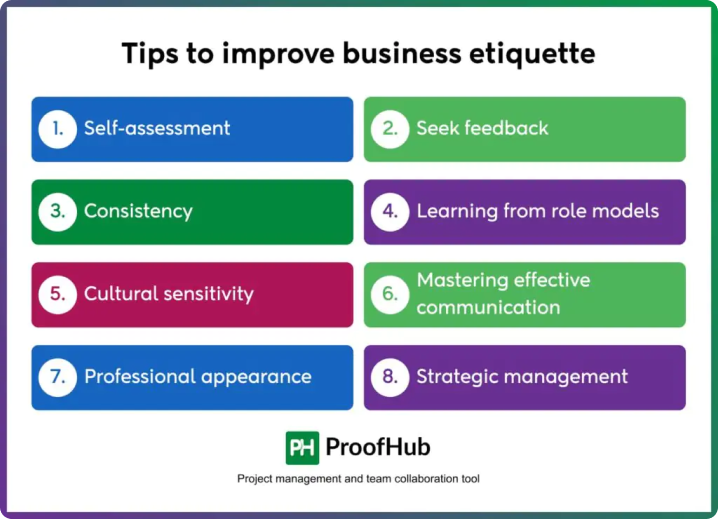
Maximize productivity of your business
Track employee productivity and simplify work with them
Core Principles of Business Etiquette
Business etiquette is based on a set of key principles that guide how professionals interact in the workplace.
These principles help ensure respectful, effective communication and contribute to a positive work environment.
Understanding and applying these core principles can foster better relationships, enhance productivity, and promote career success.
1. Respect for Others
Respect is the foundation of business etiquette. It involves treating colleagues, clients, and business partners with courtesy, consideration, and kindness. This means acknowledging their time, valuing their opinions, and being considerate of their personal space and boundaries. Simple acts like saying “please” and “thank you,” listening attentively, and being punctual all demonstrate respect in the workplace.
2. Clear and Professional Communication
Effective communication is critical in business. This involves both verbal and non-verbal communication, including body language, tone, and written messages. Clear, concise, and respectful communication helps avoid misunderstandings and fosters collaboration. Whether in face-to-face meetings, emails, or phone calls, being mindful of your language, avoiding jargon or overly casual language, and tailoring your message to the audience are essential components of good etiquette.
3. Punctuality
Being on time is a sign of professionalism and respect for others’ time. Arriving late to meetings or missing deadlines can create frustration and disrupt the flow of work. Whether attending meetings, responding to emails, or completing tasks, punctuality reflects reliability and demonstrates a commitment to your responsibilities. In global business contexts, understanding time zones and scheduling accordingly also reflects a high level of respect.
4. Appropriate Appearance
How you present yourself in the workplace speaks volumes about your professionalism. Dressing appropriately for the work environment, following dress codes, and maintaining personal hygiene are key aspects of business etiquette. Your attire should be clean, neat, and suitable for the specific business culture you’re in—whether that’s a corporate office, a creative environment, or a remote setting.

5. Active Listening
Listening attentively and without interruption is a fundamental aspect of business etiquette. Active listening shows that you value what others have to say and fosters a deeper understanding of their perspective. This involves giving your full attention, asking clarifying questions when necessary, and refraining from distractions during conversations. When you listen actively, it helps build rapport and trust with colleagues, clients, and superiors.
6. Maintaining Professional Boundaries
Establishing and respecting personal and professional boundaries is essential in any workplace. Understanding when and how to engage with others, especially in terms of social interactions, helps maintain a professional atmosphere. Being aware of the appropriate level of formality and ensuring you don’t overstep personal space or time shows maturity and self-awareness.
7. Adaptability and Cultural Sensitivity
In today’s globalized workplace, it’s important to be adaptable and culturally sensitive. Different cultures have different norms for communication, behavior, and decision-making. Adapting your behavior to respect these differences is essential in building strong, respectful international relationships. Showing awareness of cultural nuances, such as addressing someone by their correct title or understanding meeting etiquette in different regions, enhances your professionalism and helps avoid misunderstandings.
8. Confidentiality and Discretion
In business, maintaining confidentiality and discretion is crucial. Respecting the privacy of colleagues, clients, and sensitive information reflects integrity and trustworthiness. Whether discussing company matters or personal information, handling conversations and documents with discretion builds credibility and ensures that your reputation remains intact.
9. Positive Attitude and Professionalism
A positive attitude in the workplace can set the tone for both individual and team success. Approach challenges with a constructive mindset, offer solutions instead of complaints, and always behave in a manner that reflects professionalism. A positive attitude promotes a healthy work environment, boosts morale, and encourages collaboration.
10. Gratitude and Acknowledgment
Expressing gratitude and acknowledging others’ contributions is a simple yet powerful way to reinforce positive relationships. Thanking someone for their help, recognizing achievements, or showing appreciation for hard work all contribute to a respectful and encouraging work culture. This fosters goodwill, motivates colleagues, and builds strong team dynamics.
Conclusion
Mastering business etiquette is a vital skill that goes beyond knowing the right fork to use at a dinner meeting. It’s about demonstrating respect, professionalism, and cultural awareness in every interaction.
By following these principles, you can build stronger relationships, enhance your reputation, and pave the way for long-term professional success.
– The Monitask Team
Frequently Asked Questions
How should I handle professional greetings?
A firm handshake, maintaining eye contact, and using a polite tone are key to professional greetings. When in doubt, address others using their titles (Mr., Ms., Dr.) until given permission to use their first names.
What is the importance of punctuality in business etiquette?
Punctuality shows respect for others’ time, conveys professionalism, and demonstrates reliability. Being late can cause disruptions, create a negative impression, and undermine trust.
How should I behave in virtual meetings?
For virtual meetings, ensure you are on time, mute yourself when not speaking, maintain eye contact via the camera, and dress professionally. Be mindful of background noise and distractions, and follow the meeting’s agenda.
Can business etiquette affect my career advancement?
Absolutely. Demonstrating good business etiquette can help you stand out as a professional, build strong relationships, and make a positive impression on leadership, which may enhance your chances for promotions and new opportunities.

